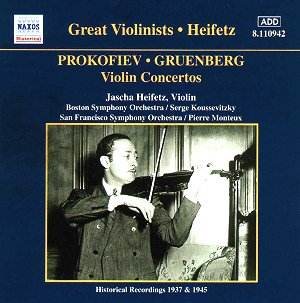Great Violinist series - Jascha Heifetz
Sergei PROKOFIEV Violin Concerto No 2
(1935)
Louis GRUENBERG Violin Concerto (1943)
 Jascha Heifetz (violin)
Jascha Heifetz (violin)
Boston SO/Koussevitsky [rec 20 Dec 1937]
San Francisco SO/Monteux [rec 17 Dec 1945]
mono recordings
 NAXOS HISTORICAL 8.110942
[62.16]
NAXOS HISTORICAL 8.110942
[62.16]
Crotchet
(pre-release so keep trying this sales link until
it works)

The expiry of copyright and the tender loving transfers of Mark Obert-Thorn
combine to bring the latest in a series of seven Heifetz discs to your
collection. That Naxos bring all this to us at budget price is all the more
remarkable. Small wonder that this company has turned the retail classical
market upside down and changed the face of record shops across the world.
Although Heifetz produced a stereo version of the Prokofiev for RCA - BMG
there was no second version of the Gruenberg. Gruenberg (1884-1964), a peripheral
figure, will be known to discophiles because of this recording. His opera
Emperor Jones (1932) also briefly held centre-stage largely as a result
of Lawrence Tibbett's singing of the role of an American black man. What
of the concerto? It was commissioned by Heifetz and premiered on 1 December
1944. The first movement is ripely romantic - closer to the Walton and Korngold
than to the Prokofiev. It is over-candied though the warm Delian flow of
middle movement will appeal to the sweet-toothed and sustain interest at
least until it succumbs to mawkish spirituals and hill-billy tunes. The solo
line is spun with sloe-eyed succulence by Heifetz. It is in the finale that
fragments of jazz and popular rhythms rise to the surface. Tully Potter's
welcome notes tell us that Gruenberg was aiming at a popular work and the
camp high jinks of the last movement suggest he fulfilled his aim. Not wanting
to be too po-faced about this but there is enough substance in the serious
Gruenberg (to be sampled in the first part of the slow movement) to make
me sanguine about his other music. There are five symphonies, and pair each
of piano quintets and piano concertos. The Prokofiev has a fruity élan
in Heifetz's hands but it is no match as a work for the First Concerto. Its
phrases recall the great Romeo and Juliet score. In the andante
assai this strand touches the pristine world of Bach. Heifetz is throughout
as secure and as brilliant as you might expect.
Rob Barnett


